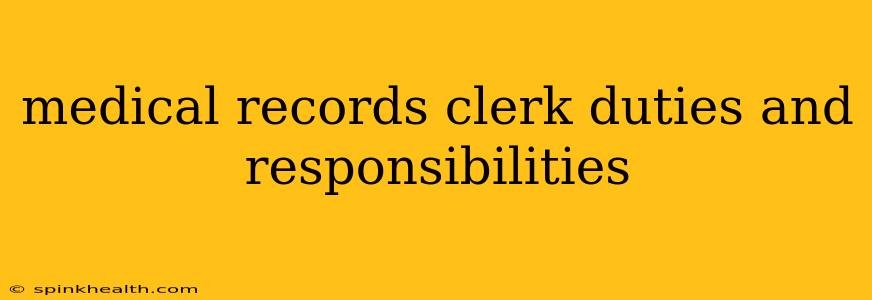A Day in the Life: Unveiling the Crucial Role of a Medical Records Clerk
The bustling atmosphere of a healthcare facility is a whirlwind of activity, and nestled within this dynamic environment is the often-unsung hero: the medical records clerk. These individuals are the guardians of patient information, ensuring accuracy, accessibility, and confidentiality in a world increasingly reliant on digital health records. But what exactly does a medical records clerk do? Let's delve into the fascinating world of their daily responsibilities and uncover the vital contributions they make to the smooth operation of any healthcare setting.
Imagine this: you're Sarah, a dedicated medical records clerk at a bustling city hospital. Your day begins not with a frantic rush, but with a methodical approach. You're responsible for the integrity of thousands of patient files, a responsibility you take incredibly seriously.
Maintaining Accuracy and Accessibility: The Heart of the Job
Your first task involves reviewing incoming patient charts. This isn't simply a matter of filing; it’s about ensuring every piece of documentation is complete, accurate, and properly coded according to established medical standards. You meticulously check for missing information, address any discrepancies, and ensure the patient's data is consistently updated. This accuracy is paramount for accurate diagnoses, effective treatment, and seamless patient care.
H2: What are the key responsibilities of a medical records clerk?
This is a question often posed by those exploring this career path. The responsibilities extend far beyond simple filing. It involves a delicate balance of organizational skills, attention to detail, and a deep understanding of medical terminology and privacy regulations. Key responsibilities include:
- Chart preparation and maintenance: This includes assembling, organizing, and indexing patient records, ensuring completeness and accuracy.
- Data entry and updating: Inputting patient information into electronic health record (EHR) systems, maintaining data integrity and consistency.
- Record retrieval and release: Responding to requests for patient records, adhering strictly to privacy regulations (HIPAA) and release-of-information protocols.
- Filing and storage: Maintaining a well-organized filing system, both physical and electronic, for efficient retrieval of patient information.
- Quality control: Regularly reviewing records for completeness and accuracy, identifying and resolving inconsistencies.
- Maintaining confidentiality: Strictly adhering to privacy regulations and protecting the sensitive information entrusted to you.
H2: What software do medical records clerks use?
Technology plays a crucial role in modern healthcare, and medical records clerks are at the forefront of this digital transformation. Proficiency in various software programs is essential. Commonly used software includes:
- Electronic Health Record (EHR) systems: These are the core tools for managing and accessing patient information, with systems like Epic and Cerner being widely adopted.
- Database management software: Clerks often utilize database software to manage and query patient data effectively.
- Document management systems: These systems help organize and retrieve digital documents efficiently.
H2: What education and training are required to become a medical records clerk?
While formal education isn't always mandatory, many employers prefer candidates with a high school diploma or equivalent. On-the-job training is common, focusing on specific software and internal protocols. However, obtaining a certification, such as a Certified Medical Records Technician (CMRT) credential, significantly enhances career prospects and demonstrates a commitment to professional development.
H2: What are the career prospects for medical records clerks?
The demand for skilled medical records clerks remains consistently high. As healthcare continues to evolve, the role becomes even more critical in managing the vast amounts of patient data generated daily. Career advancement opportunities include supervisory roles, specializing in coding or release of information, or transitioning to related healthcare fields.
Sarah's day isn't just about paperwork; it's about contributing to the well-being of patients. Her accuracy and diligence ensure that medical professionals have access to the right information at the right time, impacting patient care directly. The seemingly mundane tasks performed by medical records clerks are, in fact, the bedrock upon which efficient and effective healthcare systems are built. They are essential, vital components of the healthcare machine, and their work deserves recognition and appreciation.

